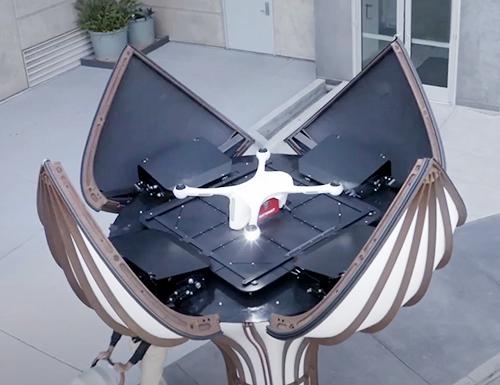Hospitals in United States and Germany Team Up with Matternet and UPS to Make Medical Laboratory Deliveries by Drone the New Normal
Service uses ‘hub-and-spoke’ routing model to provide rapid delivery of time-and-temperature-sensitive clinical laboratory specimens and supplies
Drone delivery service in healthcare is beginning to take flight both here and abroad, with California-based Matternet launching medical drone delivery networks in Winston-Salem, North Carolina, and Berlin, Germany.
The successful use of unmanned aircraft to deliver patient specimens has major implications for clinical laboratories. When conditions allow them to fly, drones can significantly shorten delivery times of routine patient specimens such as blood and urine.
According to an iQ Healthtech news release, North Carolina’s Wake Forest Baptist Medical Center’s central campus will be the site of the drone delivery industry’s first hub-and-spoke operating model, which launches drones from one central location to multiple locations. Drone-maker Matternet is teaming up with UPS’ drone delivery service, UPS Flight Forward (UPSFF), and Winston-Salem-based iQ Healthtech Labs to operate Matternet’s M2 drones across the hospital system.
Drone Delivery Can Save Time and Money
The drones will fly two routes and carry scheduled deliveries of specialty infusion medicines and personal protective equipment (PPE). Because infusion medicines are patient-specific, high cost, and have a short shelf life, delivery by drone within 10 minutes is an ideal solution, Matternet said in the news release. Individually compounded medicines also will be delivered on-demand for dispensing to patients who need real-time access to treatments.

“This partnership with UPSFF aligns strategically with our mission to improve the health of those in the communities that we serve as well as our Virtual Health sector in iQ Healthtech Labs,” said Jane Shen, PharmD (above), Chief Strategy Officer at the Wake Forest Institute for Regenerative Medicine, and Head of Sector Development for Innovation Quarter, a subsidiary of iQ Healthtech Labs, in the IQ Healthtech Labs news release. “We seek to leverage technology advances to make access to healthcare easier and more effective. Collaborating in innovative ways with a key logistics partner like UPS allows Wake Forest Baptist to deliver care in better and more efficient ways to patients and their families.” (Photo copyright: Triad Business Journal.)
Matternet has been operating in the US since August 2018. In, “WakeMed Uses Drone to Deliver Patient Specimens,” Dark Daily’s sister publication, The Dark Report, reported how—following a two-year trial period using a quadcopter to deliver patients’ samples from a physicians’ office satellite lab/draw station to the WakeMed Medical Center’s central lab—the North Carolina healthcare system, in partnership with UPSFF, completed the first successful revenue-generating commercial transport of lab supplies by drone in the US at WakeMed’s flagship hospital and campus in Raleigh, N.C.
Since then, more than 2,200 deliveries of lab samples have been completed. The service at Wake Forest Baptist Health, as well as WakeMed, are part of North Carolina Department of Transportation’s participation in the Federal Aviation Administration’s (FAA’s) Unmanned Aircraft System Integration Pilot Program, Matternet stated in a news release.
Bala Ganesh, a Vice President of Engineering at UPS, said UPSFF, which was launched in July 2019, is focused on healthcare deliveries. To make drone deliveries commercially viable, both “criticality” and an industry’s “willingness to pay” are important, he said. “We never looked at delivering pizza,” he told Forbes. UPSFF is the first company to receive the FAA’s Part 135 certification (package delivery by drone).

The video above demonstrates Matternet’s “Easy-to-use interface for sending and receiving packages 24/7/365.” The Matternet Station (above) is “integrated with the Matternet Cloud [Matternet’s proprietary software platform for operating Matternet networks] and the M2 Drone for payload and battery exchange, and autonomous take-off and landing. The station “can store up to seven payloads and batteries and hold one Matternet M2 Drone in its hangar.” Hospital-based clinical laboratory managers will appreciate the ease at which the station can be accessed by lab personnel. Click here to watch the full video. (Video and caption copyright: Matternet.)
BVLOS Drone Delivery of Clinical Laboratory Specimens in Europe
Last year, Matternet launched the first beyond-visual-line-of-sight (BVLOS)-operated medical drone network in Europe. Its unmanned aircraft will be flown without the requirement that a pilot always maintain a visual line of sight on the aircraft.
Matternet launched its BVLOS operations at Labor Berlin, Europe’s largest hospital laboratory, which includes facilities in 13 hospitals across Berlin.
“We continue to expand drone delivery operations around the world with a focus on urban environments,” said Andreas Raptopoulos, Matternet Founder and CEO, in a press release. “Hospitals and laboratories in densely populated cities like Berlin need fast and predictable transportation methods that avoid urban congestion. We are thrilled to partner with Labor Berlin and look forward to streamlining their diagnostics work to the benefit of Berlin’s hospitals and residents.”
According to the press release, Matternet’s drone delivery network will transport samples from hospitals to Labor Berlin facilities up to 70% faster than ground courier services, as well as reducing vehicular traffic and emissions in Berlin’s urban core. Currently, more than 15,000 samples are transported daily across Labor Berlin’s healthcare system.
Will Drone Delivery of Clinical Laboratory Specimens Become the New Normal?
“I think that this is the wave of the future,” Atrium Health Senior Vice President Conrad Emmerich, who previously served as Senior Vice President, Business Services, at Wake Forest Baptist Health, told Fox 8 News.
It’s certainly beginning to look as if drone delivery as a viable alternative to traditional transport methods is taking off (pun intended). Since 2017, Dark Daily has published 10 ebriefings on drone delivery systems for healthcare being trailed worldwide.
Even Amazon is getting into the business of drone delivery and may be eyeing healthcare as the next industry to disrupt, which Dark Daily covered in “Amazon’s Prime Air Drone Fleet Receives FAA Approval to Make Deliveries to Customers, Could Clinical Laboratory Specimens and Supplies be Next?”
Since the shortest distance between two points is a straight line, regular transporting of clinical laboratory specimens and supplies by drone could reduce transit times between hospitals and clinical laboratories and lower laboratory specimen transportation costs.
Hospital administrators and medical laboratory executives may want to keep tabs on the expansion of such services into their regions. There may be opportunities to improve clinical outcomes and patient satisfaction.
—Andrea Downing Peck
Related Information
Wake Forest Baptist Health, iQ Healthtech Labs Launch Drone Delivery Service with UPS Flight Forward
North Carolina Hospital Chain Begins Drone Deliveries of Medicines
Matternet Launches Drone Delivery Operations at Labor Berlin in Germany
Matternet Launches BVLOS Medical Drone Delivery Operations in Berlin
Wake Forest Baptist Health Looking to Expand Drone Delivery Service



